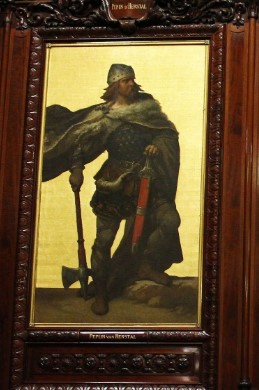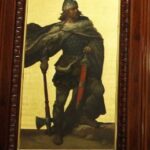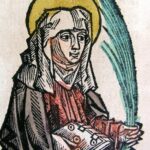
Date of Birth
Circa 635
Place of Birth
Heristal, Liege, Belgium
Towns / Cities Moved Into
Heristal, Liege, Belgium |
Jupile on the Junille, Meuse, France
Known Occupation
Duke of Austrasia; Mayor of Palace, Austrasia
Religion
-
Death Information
Year of death
Dec 16 714
Place of death
Jupile on the Junille, Meuse, France
Cause of death
Pepin died during a campaign
Burial location
Notre-Dame de Chèvremont Liège, Arrondissement de Liège, Liège, Belgium
Obituary

Parents

Duke Maire Du Palais Ansgise Margrave Of Scheldt Ansgise

St Beggue Ansgise (born Austrasia)
Marital Status


Married Pepin “The Younger” De Heristal
Children



Narrative / Story
Pepin “The Younger” De Heristal, born circa 635 in Heristal, Liege, Belgium, was a figure of significant historical importance. His life, marked by political and military achievements, was deeply intertwined with the socio-political fabric of his era. As Duke of Austrasia and Mayor of the Palace in Austrasia, Pepin’s role was pivotal in shaping the early medieval European landscape.
Pepin’s early life in Heristal was likely influenced by the prevailing socio-economic conditions of the time. The region, part of the Frankish realm, was undergoing transformations with the rise of the Carolingian dynasty. His upbringing in a noble family positioned him at the center of political power struggles and ecclesiastical reforms. The socio-economic status of his family shielded him from the hardships faced by commoners, such as poverty and lack of education.
His move to Jupile on the Junille, Meuse, France, marked a significant phase in his life. This relocation was not just a physical move but also a step into greater political responsibilities. As a leader, Pepin would have faced the challenges of managing diverse populations, dealing with political rivals, and navigating the complex relationships between the Frankish nobility and the Church.
Pepin’s work life as a Duke and Mayor of the Palace was demanding. He was responsible for administering his territories, leading military campaigns, and making strategic decisions that impacted the lives of his subjects. His military campaigns, particularly against the Lombards in Italy, were crucial in expanding the Frankish influence and securing the papacy’s support.
The period of Pepin’s rule was marked by significant socio-economic changes. The Frankish kingdom was expanding, integrating various cultures and peoples. This expansion brought challenges, including managing diverse populations and integrating different socio-economic systems. The Church played a crucial role during this time, not only in spiritual matters but also in temporal affairs, influencing policies and governance.
Pepin’s personal life was as complex as his public persona. His marriages and relationships, particularly with his concubine Aupais (Alpaide; Elphide; Chalpaida) de Heristal, were integral to his legacy. His children, including Charles “Martel” Caolus Nibelung, Childebrand I, and Gertrude d’Austrasia, continued his lineage and played significant roles in the history of Europe.
Pepin’s death on December 16, 714, during a campaign, marked the end of an era. His burial in Jupile on the Junille, Meuse, France, was a testament to his life’s journey from a noble birth in Heristal to a revered leader in the Frankish kingdom.
The historical events during Pepin’s lifetime were transformative for Europe. His reign from 0687 to 0714 saw the consolidation of Frankish power and the strengthening of the Church’s influence. His interventions in favor of the papacy against the Lombards and his legislative and ecclesiastical reforms were significant in shaping the medieval European socio-political landscape.
Pepin’s life and reign were a reflection of the complexities and dynamism of early medieval Europe. His story is not just about his achievements but also about the socio-economic and political transformations of his time. His legacy, somewhat overshadowed by his more famous son Charlemagne, remains a crucial part of European history.